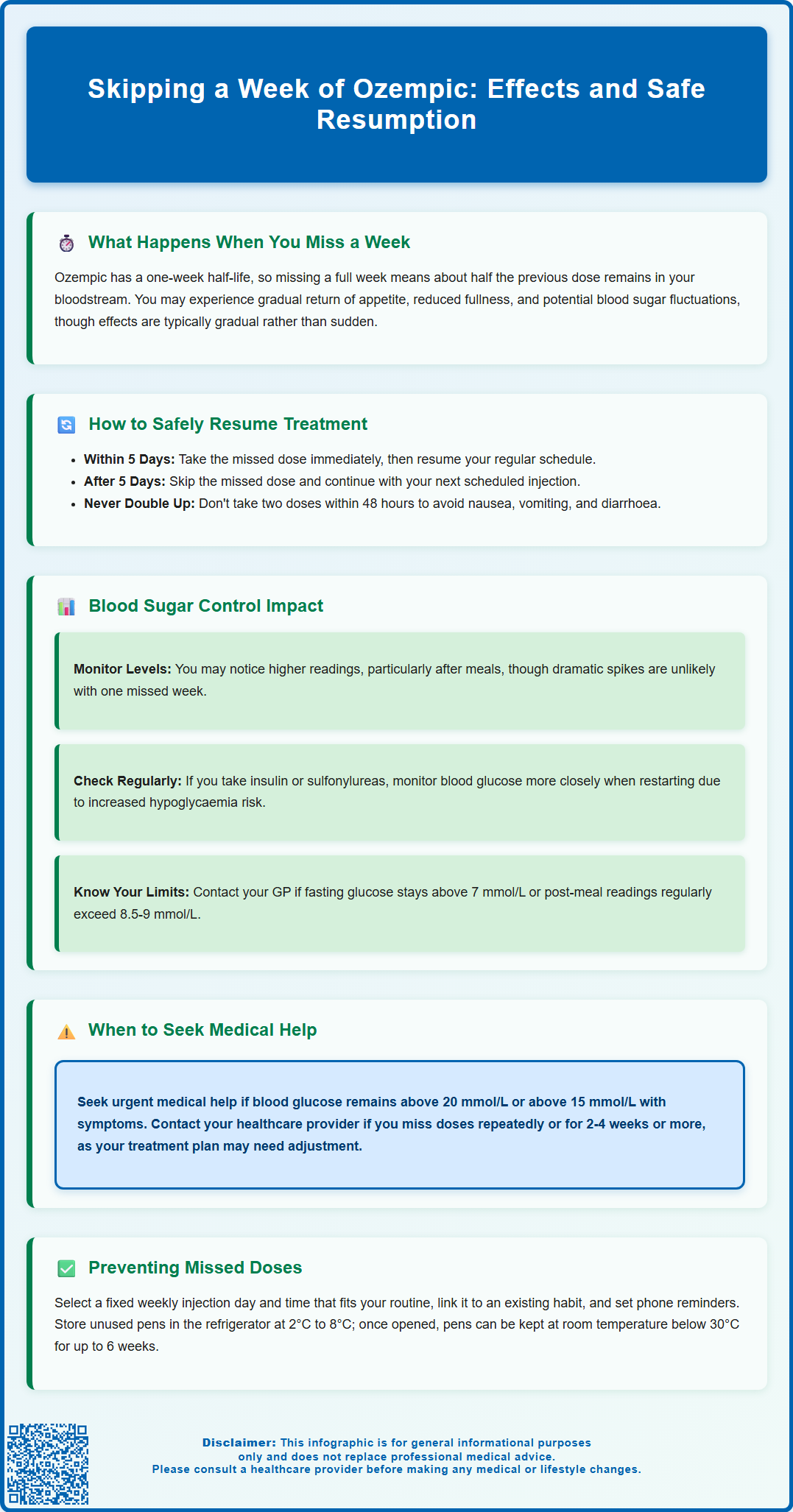Skipping a week of Ozempic (semaglutide), a once-weekly GLP-1 receptor agonist licensed in the UK for type 2 diabetes, can affect your treatment outcomes. Whilst missing a single dose is unlikely to cause immediate harm, it interrupts the steady drug levels needed for optimal blood glucose control. Semaglutide has a half-life of approximately one week, meaning therapeutic effects gradually diminish when doses are missed. Understanding what happens when you skip Ozempic, how to safely resume treatment, and strategies to maintain consistent adherence are essential for effective diabetes management under NHS care.
Summary: Missing a week of Ozempic gradually reduces therapeutic drug levels, potentially affecting blood glucose control, though serious harm is unlikely from a single missed dose.
- Semaglutide (Ozempic) is a once-weekly GLP-1 receptor agonist with a half-life of approximately one week, licensed in the UK for type 2 diabetes treatment.
- If more than five days have passed since your missed dose, skip it entirely and resume at your next scheduled injection—never take two doses within 48 hours.
- Missing a week may cause gradual blood sugar elevation, return of appetite, and potential gastrointestinal side effects when restarting treatment.
- Contact your GP if fasting glucose consistently exceeds 7 mmol/L or if you experience symptoms of hyperglycaemia after missing doses.
- Consistent weekly dosing is essential for maintaining steady-state drug levels and optimal glycaemic control in type 2 diabetes management.
Table of Contents
What Happens When You Miss a Week of Ozempic
Ozempic (semaglutide) is a once-weekly glucagon-like peptide-1 (GLP-1) receptor agonist licensed in the UK for the treatment of type 2 diabetes mellitus. When you miss a full week of Ozempic, the medication's therapeutic effects begin to diminish as drug levels decline in your system.
Semaglutide has a half-life of approximately one week, meaning that after seven days without an injection, roughly half of the previous dose remains in your bloodstream. However, missing an entire week means you're approaching the point where therapeutic drug concentrations fall below optimal levels. The immediate consequences vary between individuals but may include a gradual return of appetite, reduced feelings of satiety, and potential fluctuations in blood glucose levels.
For patients using Ozempic for glycaemic control, missing a week may result in elevated blood sugar readings, though the effect is typically gradual rather than sudden due to the medication's long duration of action. It's important to note that missing a single week is unlikely to cause serious harm in most cases, but it does interrupt the steady-state drug levels that provide consistent therapeutic benefit. Complete washout of the medication takes approximately 4-5 weeks.
The MHRA-approved prescribing information acknowledges that missed doses can occur and provides specific guidance for resuming treatment safely. If you've missed a week of Ozempic, understanding how to restart appropriately is essential to maintain treatment efficacy whilst minimising potential side effects.
Note that Ozempic is not indicated for weight management (a different semaglutide product, Wegovy, is licensed for this purpose) and is not suitable for people with type 1 diabetes or diabetic ketoacidosis.

How to Safely Resume Ozempic After a Missed Dose
The official guidance for resuming Ozempic depends on how much time has elapsed since your last scheduled dose. According to the Summary of Product Characteristics (SmPC) approved by the MHRA, if fewer than five days have passed since your missed dose, you should administer the injection as soon as you remember, then continue with your regular weekly schedule. However, if more than five days have passed—which would be the case if you've skipped an entire week—you should skip the missed dose entirely and resume with your next scheduled injection. Never take two doses within 48 hours of each other.
When restarting after missing a week or more, it's crucial not to double up on doses or take extra medication to 'catch up'. Doing so increases the risk of gastrointestinal side effects such as nausea, vomiting, and diarrhoea, which are the most commonly reported adverse reactions with semaglutide therapy. The medication works through a gradual build-up in your system, and maintaining consistent weekly dosing is key to both efficacy and tolerability.
Some patients may experience a temporary return of side effects when resuming treatment after a gap, particularly nausea or reduced appetite. These effects are usually mild and transient for most people, similar to when you first started the medication. If you experience severe or persistent gastrointestinal symptoms, contact your GP or diabetes specialist nurse for advice. Seek urgent medical attention if you develop severe or persistent abdominal pain (which could indicate pancreatitis), signs of gallbladder disease, or significant vomiting that could lead to dehydration.
It's advisable to inform your healthcare provider if you've missed doses, especially if this happens repeatedly or if the gap is prolonged (2-4 weeks or more). Your prescriber may wish to review your treatment plan, discuss any barriers to adherence, or consider whether adjustments to your diabetes regimen are needed. If you take insulin or sulfonylureas alongside Ozempic, you may need closer blood glucose monitoring when restarting, as there could be an increased risk of hypoglycaemia. Never restart Ozempic at a higher dose than you were previously taking without medical supervision, as dose escalation should always follow the licensed titration schedule to minimise adverse effects.
Will Skipping Ozempic Affect Your Blood Sugar Control
For individuals with type 2 diabetes, missing a week of Ozempic can impact glycaemic control, though the extent varies depending on several factors including your baseline HbA1c, concurrent medications, diet, and physical activity levels. Semaglutide works through multiple mechanisms: it enhances glucose-dependent insulin secretion, suppresses inappropriately elevated glucagon secretion, and slows gastric emptying. When treatment is interrupted, these beneficial effects gradually diminish.
Clinical studies demonstrate that semaglutide produces sustained improvements in HbA1c and fasting plasma glucose when taken consistently. Missing a single week is unlikely to cause dramatic blood sugar spikes in most patients, particularly if you're also taking other glucose-lowering medications such as metformin. However, you may notice higher readings on your glucose monitor, especially postprandial (after-meal) values, as the medication's effect on gastric emptying and insulin response wanes.
NICE guidelines for type 2 diabetes management emphasise the importance of medication adherence for achieving and maintaining glycaemic targets. If you're monitoring your blood glucose at home, you should continue regular testing after missing a dose. Contact your GP or diabetes care team if you observe:
-
Fasting blood glucose consistently above 7 mmol/L
-
Postprandial readings regularly exceeding 8.5-9 mmol/L
-
Symptoms of hyperglycaemia (increased thirst, frequent urination, fatigue)
-
Any readings above 15 mmol/L, especially if you feel unwell
Seek urgent medical advice if your blood glucose remains persistently above 20 mmol/L or above 15 mmol/L with symptoms. If you take insulin or an SGLT2 inhibitor, or if advised by your healthcare team, check your ketone levels when unwell or if your glucose is significantly elevated.
It's worth noting that the impact on blood sugar control is generally less pronounced than missing doses of shorter-acting medications like insulin or sulphonylureas, due to semaglutide's extended half-life. Nonetheless, consistent weekly dosing remains essential for optimal diabetes management and reducing long-term complications. If you find yourself frequently missing doses, discuss this with your healthcare team, as they may be able to identify practical solutions or consider alternative treatment options that better fit your lifestyle.
Preventing Missed Doses: Practical Tips for Ozempic Users
Maintaining consistent adherence to once-weekly Ozempic injections requires establishing reliable routines and addressing potential barriers proactively. Research into medication adherence shows that practical strategies significantly improve consistency with injectable therapies.
Choose a consistent injection day and time that aligns with your weekly routine. Many patients find success by selecting the same day each week—such as every Sunday morning or Monday evening—and linking it to an existing habit like a weekly meal or television programme. Setting a recurring alarm on your mobile phone or using a medication reminder app can provide helpful prompts. If you need to change your injection day, ensure there are at least 48 hours between doses.
Proper storage and preparation are essential. Ozempic pens should be stored in the refrigerator (2°C to 8°C) before first use, with the pen cap on to protect from light. Do not freeze. Once in use, pens can be kept at room temperature (below 30°C) for up to six weeks. Always store without the needle attached and discard the pen 6 weeks after first use, even if some medicine remains. Keep your medication visible—perhaps in a designated spot in your refrigerator—rather than hidden away where it might be forgotten. If you travel frequently, invest in a medical-grade cooling case to maintain appropriate storage conditions.
Consider these additional strategies:
-
Use a medication diary or smartphone app to track injections
-
Prepare your injection supplies the evening before your scheduled dose
-
Inform a family member or friend of your injection schedule for accountability
-
Set up prescription reminders through your pharmacy to ensure you never run out
-
Keep your GP or diabetes nurse's contact details readily available
-
Dispose of used needles in an NHS-provided sharps bin
-
Rotate injection sites and never share pens or needles
If you anticipate disruptions to your routine—such as holidays, shift work, or hospital admissions—plan ahead by discussing with your healthcare provider. The injection day can be changed if necessary, provided there are at least two days (48 hours) between doses. Your pharmacist can also provide practical advice on managing your medication during travel or schedule changes.
For patients struggling with injection anxiety or technique, diabetes specialist nurses offer training and support. Some areas provide access to injection support services through NHS diabetes clinics. Remember that consistent adherence not only optimises your treatment outcomes but also helps you gain the full benefit of Ozempic therapy for glycaemic control.
If you experience any suspected side effects from Ozempic, report them to the MHRA through the Yellow Card scheme (yellowcard.mhra.gov.uk or the Yellow Card app).
Frequently Asked Questions
Can I take two Ozempic doses close together if I've missed a week?
No, never take two Ozempic doses within 48 hours of each other. If more than five days have passed since your missed dose, skip it entirely and resume at your next scheduled weekly injection to avoid increased side effects.
Will my blood sugar spike immediately after missing one Ozempic injection?
Blood sugar changes are typically gradual rather than sudden due to semaglutide's long half-life of approximately one week. However, you may notice higher readings, particularly after meals, as the medication's effects diminish.
Should I contact my GP after missing a week of Ozempic?
Inform your healthcare provider if you miss doses repeatedly or if the gap exceeds 2-4 weeks. Contact your GP immediately if you experience fasting glucose consistently above 7 mmol/L, symptoms of hyperglycaemia, or any severe abdominal pain after resuming treatment.
The health-related content published on this site is based on credible scientific sources and is periodically reviewed to ensure accuracy and relevance. Although we aim to reflect the most current medical knowledge, the material is meant for general education and awareness only.
The information on this site is not a substitute for professional medical advice. For any health concerns, please speak with a qualified medical professional. By using this information, you acknowledge responsibility for any decisions made and understand we are not liable for any consequences that may result.
Heading 1
Heading 2
Heading 3
Heading 4
Heading 5
Heading 6
Lorem ipsum dolor sit amet, consectetur adipiscing elit, sed do eiusmod tempor incididunt ut labore et dolore magna aliqua. Ut enim ad minim veniam, quis nostrud exercitation ullamco laboris nisi ut aliquip ex ea commodo consequat. Duis aute irure dolor in reprehenderit in voluptate velit esse cillum dolore eu fugiat nulla pariatur.
Block quote
Ordered list
- Item 1
- Item 2
- Item 3
Unordered list
- Item A
- Item B
- Item C
Bold text
Emphasis
Superscript
Subscript












